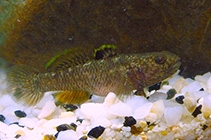| Family: |
Gobiidae (Gobies), subfamily: Gobionellinae |
| Max. size: |
4.7 cm TL (male/unsexed) |
| Environment: |
benthopelagic; freshwater |
| Distribution: |
Asia: known only from Sulawesi, Indonesia. |
| Diagnosis: |
Dorsal spines (total): 6-7; Dorsal soft rays (total): 7-9; Anal spines: 1-1; Anal soft rays: 7-8; Vertebrae: 27-27. Body plain brownish, mottled with irregular dark brown markings (Ref. 43716). Longitudinal scales 28-35; TRB 9-13; predorsal scales small, 16-23, usually reaching halfway between preopercular margin and eyes; ctenoid scales on sides of body usually extending forward in wedge to behind pectoral fin; third spine of dorsal fin longest, no spines elongate (Ref. 43716). Caudal fin rounded (Ref. 43716). |
| Biology: |
Restricted to freshwater, in three tectonic lakes of central Sulawesi (steep-sided, deep lakes with aquatic vegetation and with native fish fauna generally restricted to the shallow sides) (Ref. 43716). Usually found in very shallow water in Lake Matano, in less than 50 cm depth, typically among pebbles (Ref. 43716). Also in shallow, muddy bays protected from wind and wave disturbance, or where vegetation is thick such as rice paddy or Chara-filled water buffalo wallows (Ref. 43716). |
| IUCN Red List Status: |
Endangered (EN); Date assessed: 12 June 2018 (B1ab(i,ii,iii)) Ref. (130435)
|
| Threat to humans: |
harmless |
Source and more info: www.fishbase.org. For personal, classroom, and other internal use only. Not for publication.

